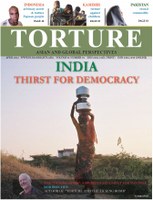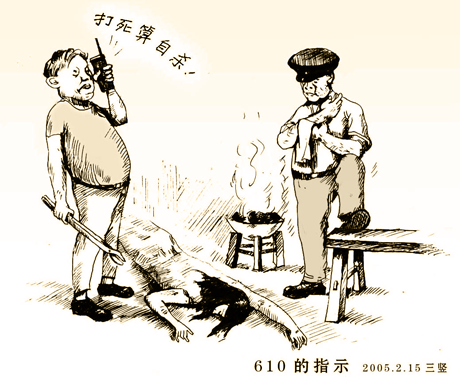THIRST FOR DEMOCRACY: Torture neither promotes democracy nor supports the rule of law. On the contrary, torture, whether openly or clandestinely used, undermines democratic governnance.
 OPINION: TORTURE: ASIA’S ELEPHANT IN THE ROOM – TISARANEE GUNASEKARA
OPINION: TORTURE: ASIA’S ELEPHANT IN THE ROOM – TISARANEE GUNASEKARA
INTERVIEW: WE ARE PATHFINDERS – BIJO FRANCIS
ANALYSIS: THE “TICKING BOMB”: A SPURIOUS ARGUMENT FOR TORTURE – BOB BRECHER
ESSAY: OF TORTURE – CESARE BECCARIA
ARTICLE: TORTURE AGAINST CHILDREN IN KASHMIR – SHEIKH HUSSAIN
INDONESIA: MILITARY IMPUNITY
PAKISTAN: TORTURE IS A NORM
VIEWPOINT: INFRINGEMENT OF TRIBS’ HUMAN RIGHTS – HESHETO CHISHI
EDITORIAL

The police radio blares, “If she dies due to the torture, just report it as suicide.” – Cartoon Courtesy: Clearwisdom.net (Note: Because of the 610 Office’s position, function and bloody crimes in persecuting Falun Gong, the international community calls it the “Chinese Gestapo.”)
TORTURE: ASIAN AND GLOBAL PERSPECTIVES
In releasing our first issue, Torture: Asian and Global Perspectives, we wish to convey our happiness and excitement at getting our message out to readers. We are only too aware that subjects covered in this magazine are not quite conducive to feelings of happiness. It can be depressing to talk about human rights, particularly in the face of such rampant abuse. Yet the emotion we would like to share with our readers in releasing this magazine is neither that of extreme joy nor of despair, but a quiet hope. Through bearing witness to suffering, we are determined to bring an inextinguishable light to countless victims of torture, an aspiration and ideal that individuals will no longer be denied their inherent dignity, liberties and rights. This is our response to the ever louder declamations against acts of senseless, lawless violence from persons and communities all over Asia.
A free and prosperous society, however, cannot be achieved through spontaneous revolution but through the gradual evolution of public opinion and values. This can only arise from proper education and the dissemination of knowledge. To this end, our magazine will seek to address in greater detail the many different aspects of torture, a practice that persists in Asia and many other places around the world, despite a litany of prohibitive laws.
Torture is often used by authoritarian regimes as a means of maintaining control and suppressing opposition. One of the reasons torture is less prevalent in some places than in others is that certain countries have open and free political processes that protect dissenting voices and institutional checks and balances to the power of any particular group. While torture is often used to address the insecurity dialogue and debate cause authoritarian regimes, there exist many historical examples societies forcing political reform despite the best efforts of whoever may be in charge. This is both a challenge and a hope for most countries in Asia today.
The concept of publishing a bi-monthly magazine on torture was borne of these circumstances, limitations and hopes. The publication will give prominent coverage to the atrocities committed by authorities and affiliated agencies against individuals legally under their protection. We seek to create a platform for the discussion and exposure of torture practices in Asia and around the globe. Each fortnightly edition will be divided into three main types of narratives: stories from individuals of their traumatic experiences, interviews with people working in the subfield of human rights violations related to torture and feature-length essays approaching torture from specific facets of psychology, forensics, philosophy and ethics, politics and law.
Our stance is firmly against any form of torture, a practice legally and morally reprehensible, and unjustifiable under all circumstances. We call for governments to investigate thoroughly and prosecute perpetrators of such brutality. We also invite our readers to participate in this campaign against torture. The global citizenry continue to hope (and should demand) that their governments, guided by the fundamental principles in the Universal Declaration of Human Rights and other international conventions, take legislative, administrative and judicial action so that not only will justice be served, but a lasting peace will be brought to humanity.
The Asian Human Rights Commission (AHRC) has helped document over the years cases of torture and other human rights violations. It has become clear that individuals and peoples across Asia are frustrated and deeply embittered by the widespread lack of respect for human rights in their countries. Yet the expression of such anger and frustration tends to stay firmly in the private or domestic sphere; such is the stranglehold authorities have on individuals through the exercise of fear. This kind of discourse is difficult, if not impossible, to monitor. Despite attempts by the media to expose state-sponsored violence, it is unable to represent and broadcast the private fears, experiences and opinions of the average person. State censorship has also proved a common blight in Asia – there is often a conscious attempt by the media to reflect a positive or at least sober mood at home and expressions of domestic malcontent are quite sophisticatedly framed as unfashionably unpatriotic. Discussions about ‘difficult’ issues like torture are discouraged and adopt the shade of social taboos. In marginally freer forums, the media practices self-censorship in order to not invite attention, criticism and recrimination. Only an already privileged minority in society is able to express their support for the status quo. But this is a magazine to “rock the boat” and open avenues for healthy discourse.
Eradicating torture is a gradual but necessary process that we all bear responsibility for. Please support us by subscribing to the print magazine so we may broaden our readership in Asia and around the world, galvanise governments and aid advocacy groups. Your help is critical for the circulation of a thing we, and the multitudes around the world, cherish and cannot easily be vanquished: hope. Let us remain steadfast in that hope we profess, of a world without violence, and a future free from fear.